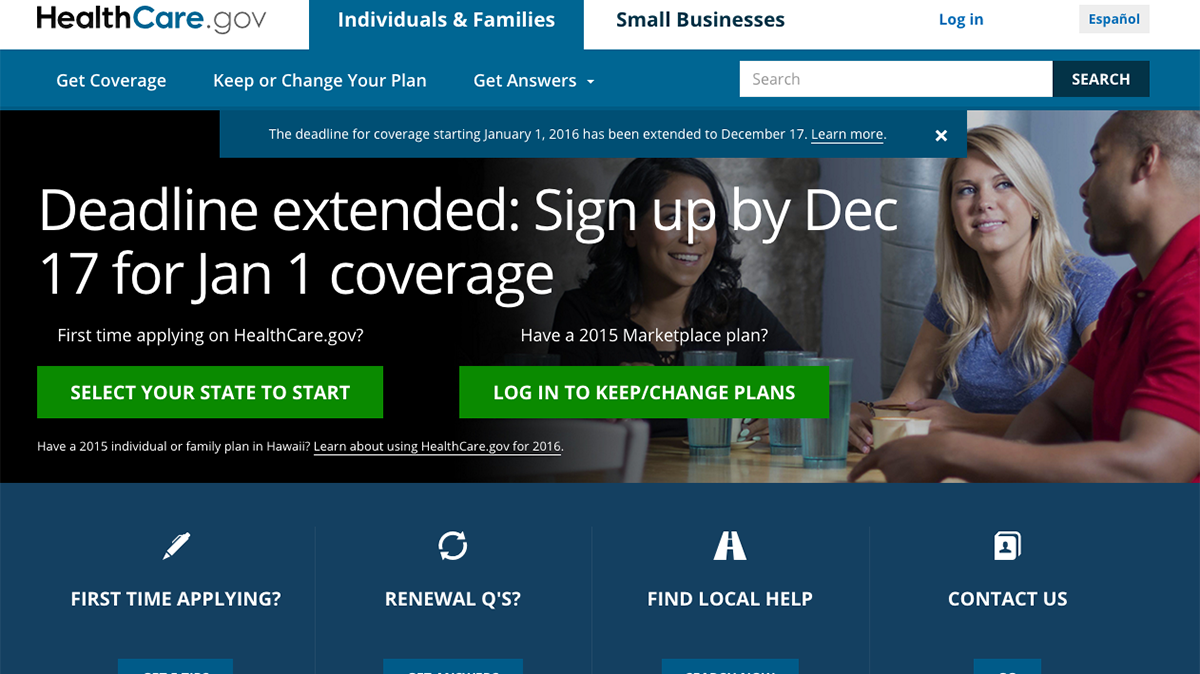Deadline for January 1 health coverage gets pushed back

image via healthcare.gov
With just a few hours left until this year’s first Obamacare deadline, procrastinators got a reprieve. On Tuesday night, the government issued a two-day extension due to “unprecedented demand,” noting that about one million Americans, unable to complete their plan selection, had left their contact information to hold a place in line.
“We want to make sure all of you have access to affordable coverage,” the Healthcare.gov website read to explain the change. “This additional 48 hours will give you a chance to come back and complete your enrollment for coverage starting January 1.”
The deadline is now set for Thursday, 11:59 PM Pacific time. Those who miss that delayed cutoff will still have a month and a half to obtain insurance for 2016, but the benefits would not begin until February or March.
“In the past few days we’ve actually seen a 30 percent increase over what we saw last year at this time,” said Antoinette Krauss, director of the Pennsylvania Health Access Network, which has two Philadelphia-based navigators and staffs a call-in helpline.
Enroll America field organizer Pedro Rodriguez said the surge in last-minute enrollees strained, but did not break, the system. As of Tuesday afternoon there were long waits for the phone, but the website had not crashed.
Part of the draw this year, he said, is recognition that the penalty for going without insurance is much higher than in the past. In 2014, the minimum fine was just $95 for an individual, and it rose to $325 in 2015. But for 2016, it will more than double, to $695.
“Some of them are really realizing that the tax penalty — almost $700 for not having health insurance — is a little bit of a bite,” he said.
Many consumers, however, won’t even need to go through the marketplace.
“Relatively few of the remaining uninsured people in Pennsylvania are eligible for the exchange,” said Cynthia Cox of the Kaiser Family Foundation. “Most of them are eligible for Medicaid.”
That included 30-year-old Jamela Thompson of North Philadelphia. She came out to the 11th Street Health Clinic in Philadelphia on Tuesday because of the deadline, hoping for subsidized coverage. But she got completely free coverage through Medicaid.
In Philadelphia, Latinos are least likely to have insurance, followed by African-Americans. Chipping away at the uninsured rate — either through public assistance or exchange enrollments — has been a priority for the city, and has met with some success.
In November, President Obama launched the Healthy Communities Challenge, in which 20 cities with large uninsured populations compete to get more people coverage. By the end of last week, Philadelphia ranked third, behind Milwaukee and Detroit.
WHYY is your source for fact-based, in-depth journalism and information. As a nonprofit organization, we rely on financial support from readers like you. Please give today.

